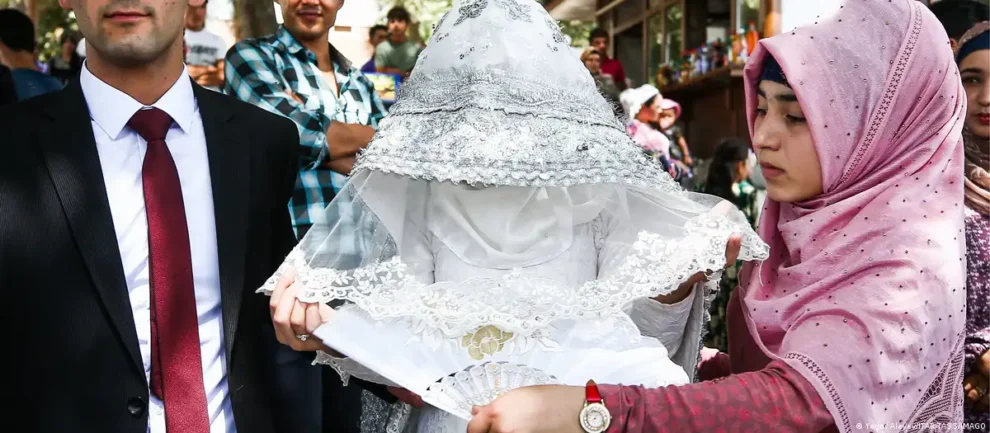Polygamy is becoming more and more common in Tajikistan. DW – about what this is connected with and what the consequences may be for women who have become a second or third wife.
The spread of polygamy in Tajikistan in recent years is associated both with the growing influence of religion on society and with the mass departure of citizens abroad, mostly young men, in search of work. The country has a very high poverty rate and it is difficult to find a well-paid job. According to the latest report from the Institute for Central Asian Studies, about 70 percent of Tajik families live off remittances: almost 1 million Tajik citizens, most of them young men, work abroad.
This is one of the reasons why many Tajik women, left without husbands after divorces, support the right of local men to polygamy, seeing this as the only way to financially provide for themselves and their children. Marriages with multiple wives are especially common among men with high and middle incomes, including officials and businessmen.
Officially, the state does not recognize polygamy and threatens violators with fines or correctional labor, but the real state of affairs is most often turned a blind eye. According to Sharia, Muslims are allowed to have several wives, their union is consecrated by a mullah, without official registration of marriage.
Why do women agree to become a second or third wife?
Feminist and graduate psychologist Firuza Mirzoyeva of the Tajik organization Public Health and Human Rights shared with DW several reasons why polygamy is rampant in the country. “Women are ready to take the status of a second, third or fourth wife in order to, so to speak, legalize their personal lives,” she says. And he adds: “It also has a material aspect: for many women in the regions who have not received higher education, and some have not even graduated from school, the only way to survive financially is to be, let’s say, the property of a man.”
Mirzoyeva cited the example of Khatlon and Sughd regions, where “girls are being prepared for marriage from childhood, and, accordingly, their education is seen as something superfluous.” In her opinion, polygamy provides women with “security”, as it gives them a certain status in society and protects them from “social claims”.
“Society has a negative attitude towards unmarried and divorced women, considering them “old maids.” “Even if a woman is successful and independent, society does not approve of her,” the human rights activist emphasizes.
From an unhappy marriage to a successful business
Amina is from Isfara, but she moved to the capital with her parents a long time ago. After graduating from the ninth grade, the young woman says, her parents married her off. “They chose my husband for me, I didn’t even know what he looked like, but I knew that he was two years older than me,” Amina added. They lived in the house of his parents, spent two months together, after which he left to work in Russia.
“In the beginning, he came once a year for a month, and then stopped coming at all. Soon I found out that he married a second time and was already living with his new family,” says Amina. “Then I decided to leave him, because he doesn’t need me and our children. I decided that I don’t need him either.” The husband’s parents did not give her three children due to the woman’s lack of material means at that time. But, as Amina notes, she often visits them to this day.
Not wanting to live in poverty and loneliness, Amina agreed to become the third wife of a 46-year-old man who “takes great care of her and helps her get back on her feet.” According to the young woman, he bought her an apartment and a car, and after a while he helped create her own business, and now she “has her own beauty salon, as well as a clothing store.” Amina believes that she does not need anything else, and the care of her second husband makes her very happy.
“Divorced, therefore, suitable to be only a second wife”
A native of the Gissar region, Manizha got married at the age of 19 and divorced after 4 months due to frequent conflicts with her mother-in-law. “These are the traditions: if you are divorced, then you are only fit to be a second wife, fate does not give other options. Family and society, unfortunately, no longer accept me,” says Manizha in an interview with DW.
Immediately after the divorce, according to Manizhi, many offered her to become a second or third wife through “nikah”, the Muslim sacred rite of marriage, promising to provide for her financially. “At first I refused, as I had not yet overcome the trauma of parting with my first husband, but due to financial circumstances and lack of housing, I had to think about offers.” Soon Manizha became the second wife of a local official. “Fortunately, very young, he is only 27 years old,” she notes.
The new husband spends with Manizha three days a week, and the rest of the days he is in his own house with his first wife and two children. The first wife, according to Manizha, is aware of their second marriage and does not mind.
“Being a second wife is my choice, I was not forced. At the moment I am very happy that there is a person in my life who takes care of me. There is no way to go against traditions and culture, so it remains to come to terms with life and thank Allah for everything that he gave me,” she notes.
“Old Maid” is not fit for a first marriage”
Sitora, originally from the Khatlon region, works in Dushanbe and has been renting a room in the capital for a long time. The 29-year-old woman was in a relationship, but it didn’t work out, and now she believes that age will not allow her to become a first wife.
Therefore, Sitora is considering becoming a second wife: “My parents will no longer accept me, as they have been waiting for my marriage for a long time. I have nowhere to go, my small salary does not allow me to rent a room all the time, especially considering that prices are skyrocketing and wages remain meager.”
A woman has long dreamed of good living conditions, of having her own children and starting a family. “I am ready to accept the status of a second, third or fourth wife. If this will help me avoid loneliness and provide future children with financial stability, then why not?” she says.
Restriction of rights and social uncertainty
However, the status of a second or third wife entails a restriction of rights and social uncertainty for women. Without official registration of marriage, women “in such relations are deprived of legal protection and have no property rights,” Firuza Mirzoyeva notes. According to her, if children are born in such a marriage and they are registered in the name of the father, then “only children can count on some kind of financial and property support.”
According to the feminist, polygamy poses significant risks for women, especially if the husband leaves or dies, as there will be no one to provide for the woman or her children. “A whole generation of children born in such marriages are faced with a prejudiced attitude towards themselves from society,” she added.
Firuza also points to the complexity of social relationships, especially between women in unequal positions. “First wives often view this situation negatively, but their financial dependence on their husbands limits their influence on men’s decision-making,” she notes in an interview with DW.
“The authorities are forced to turn a blind eye to polygamy”
According to Mirzoyeva, the Tajik authorities are forced to turn a blind eye to polygamy because of the fear that serious attempts to change the situation could lead to economic poverty for many women.
If there are any serious attempts to change the situation, a huge number of women will remain below the poverty line, as a result of which some will be forced into prostitution. Even if some of them can earn enough money for an independent existence on this, they will not be accepted in society, the feminist believes.
Source: DW News















